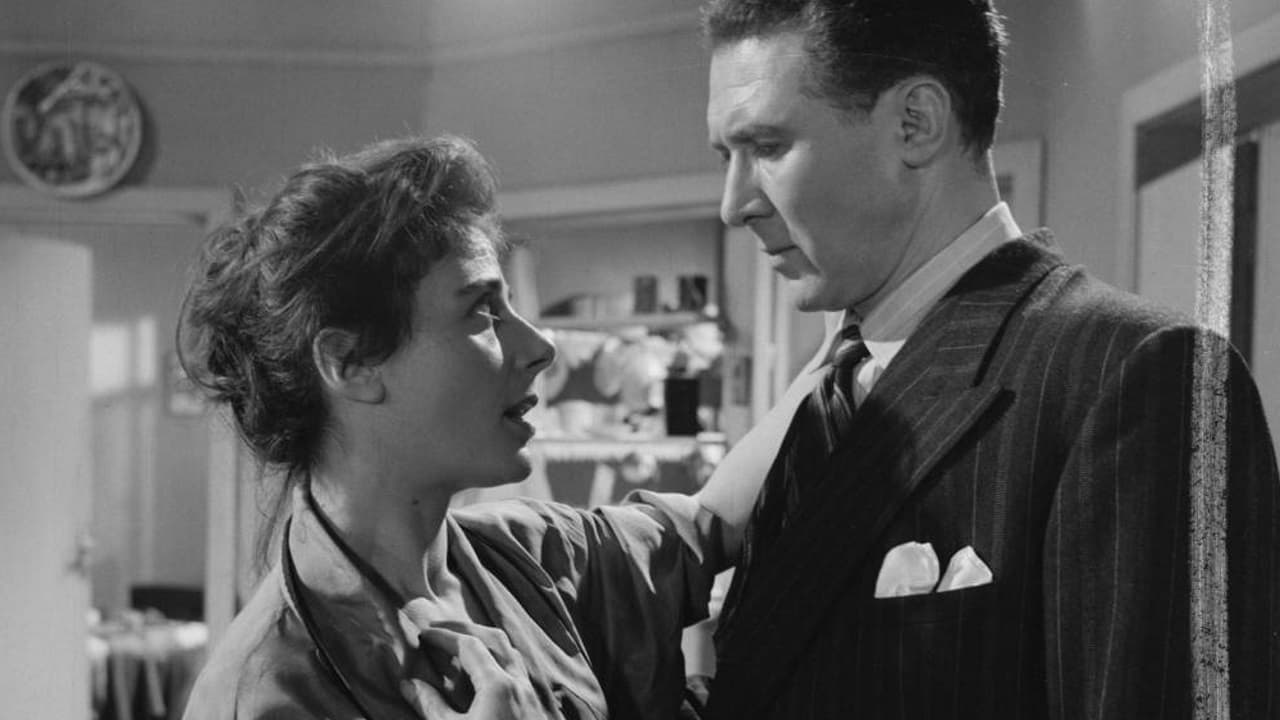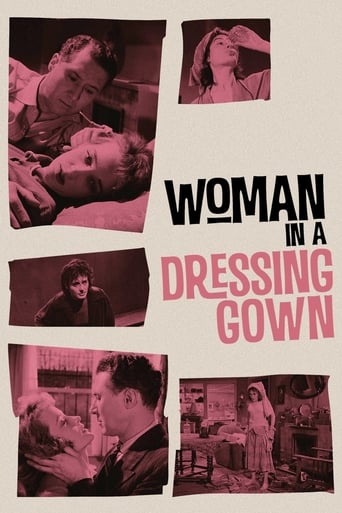

Woman in a Dressing Gown is directed by J. Lee Thompson and written by Ted Willis. It stars Yvonne Mitchell, Anthony Quayle and Sylvia Syms, music is by Louis Levy and cinematography by Gilbert Taylor.It's something of an inauspicious title, a title hardly conducive to making this piece of film leap out at you, to shout that it's essential British cinema. How wonderful to find that not only is it a title completely befitting the material being played out, but that it is actually essential British cinema.It's little known and very under seen, in fact myself was only introduced to it by a Canadian friend! The story centers on a London family of three, husband is away earning the corn at the office, teenage son is just starting out in life after school, and mother? She's on housewife auto-pilot, but disorganised with it. Her auto- pilot world is shaken to the core when it is revealed that husband is having an affair with his personal secretary, a smart and beautiful younger sort who is demanding that husband divorces wifey or it's all off...It sounds very kitchen sink, but actually it's not, it's a very smartly written picture giving credence to mental illness, to the shattering blows of infidelity, of a crumbling family dynamic, a family that in truth is homespun. Ordinary? Yes, but safe as the red brick built poky flat they dwell in. We are not asked to take sides here, to chastise or judge, Thompson and his superb cast merely ask us to delve into their world, to understand it, the psychological humdrum of 50s Britain, the starkness of marriage does mean growing old together, but that nobody ever said it was going to be easy.Looking at it now it can be viewed as a very important film in the trajectory of British cinema, Mitchell's character is the fulcrum, making the film a must see as regards the evolution of how women have been represented in Brit cinema through the years. Thompson, better known for tough macho fuelled movies on his CV, does a wonderful job in letting us feel the anguish and emotional turbulence. Hazy camera shots couple up with stark framing of the objects in the cramped flat, all marrying up to the fractured nature of Amy & Jim's marriage. There's even humour to be found, very much so, with Louis Levy's musical cue accompaniments deftly shifting from seething passions to Ealing like comedy as the home life of Amy is scattergun in execution. Kitchen sink, social realist, proto realist and etc? No! This has no pigeon hole to be placed in, it's just terrific film making, from the writing, the performances, the direction and its worth to anyone interested in classic British cinema, this demands to be sought out. And for the record, the last 20 minutes of film will move and invigorate the coldest of hearts. 9/10
... View MoreTo me this movie must be the first of the "kitchen sink" dramas of post war Britain as it came out in the fifties,long before the sixties made the genre popular. Woman in a Dressing Gown has been described by film historian Jeffrey Richards as "a Brief Encounter of the council flats", taking the scenario of a extra-marital affair and relocating to a less middle-class setting. However, writer Ted Willis described it more simply, as a film about " good honest fumbling people, caught up in tiny tragedies". As its female-focused title suggests, the film spends a lot of time on Amy, the wife whose devastated when her husband asks for a divorce. She gives it the works as the drudge who fights to rekindle the affection of her husband. There's a great bit when her new hairdo gets ruined by the rain, but it's heavy weather throughout. Amy is anything but the model '50s housewife: she burns food, never finishes the housework, always has the radio on too loud, and rarely has time to get dressed properly. But the film allows us to see reasons why she might have become that way (grief,loneliness,boredom) rather than simply demonising her. Do not watch this film if your at a low and feeling depressed as it will definitely not help. Yvonne Mitchells bravura performance won her the Berlin Film Festival's Silver Bear award for best actress
... View MoreI have seen this film exactly once, when I was about 15, on television about 35 years ago. It's unforgettable for its searing depiction of the life of postwar Britons of the middle class.Jim Preston (Quayle) is married to a woman who appears nearly helpless as a housekeeper and could be suffering from chronic depression after the death of a child. The cramped flat where they live is a suffocating mess, cabinets spilling debris, sinks filled with dishes, dustbins crammed, through which his bathrobe-clad wife drifts in a logorrheic, ash-dropping haze. By contrast, the young woman he is infatuated with is elegant and pristine, and their encounters are marked by a tranquility and privacy lacking in his domestic life.He makes one attempt to break free, causing his wife to decompensate into a hysterically sobbing invalid. His teenage son is fiercely protective of his mother and furiously rejects Preston. His life begins to come apart, and the freedom and love he yearns for slip away. He sinks back into his life, resurrecting his wife, and all goes on exactly as before--only worse.It was utterly unlike anything I had seen before, completely real, unflinching, passionate and hurtful. The B/W cinematography is done with a dingy look that captures the sooty city perfectly.This movie should come out on VHS, at least.
... View MoreI remember watching this film as a young girl. It was a bit over my head as far as the complexity of emotions but the situation was quite clear. The story of a middle aged couple: the husband, still attractive and a bit worldly, has become attracted to a young woman...the wife, a bit shop-worn and, having been a housewife and entirely devoted only to her family for nearly two decades, appears dull in the eyes of her husband. However, so moving was the performance of Ms. Mitchell as the wife, so clear the pain and desperation she displayed in attempting to keep her husband when it becomes clear she is losing him, that I remembered nearly every bit of the movie and retained it until years later when I could feel full empathy for her. I see this movie as a sad, sweet study of a universal type of woman: the house-bound, devoted and totally self-sacrificing wife who has, perhaps, given too much of herself to her family and kept too little for herself.
... View More